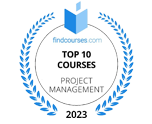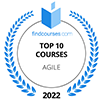 New Horizons
New Horizons
 Project Management Academy
Project Management Academy
 Six Sigma Online
Six Sigma Online
 TCM Security
TCM Security
 TRACOM
TRACOM
 Velopi
Velopi
 Watermark Learning
Watermark Learning
 New Horizons
New Horizons
 Project Management Academy
Project Management Academy
 Six Sigma Online
Six Sigma Online
 TCM Security
TCM Security
 TRACOM
TRACOM
 Velopi
Velopi
 Watermark Learning
Watermark Learning
Industry trends have shown Agile project management can increase project success rates. This is leading many organizations to integrate Agile into their predictive practices. This course will provide you with best practices and considerations for bringing Agile methodologies into your traditional project delivery environment. You'll learn how to create a strategy for setting goals and deciding on the appropriate Agile methods to integrate into your organization.
You will be given a brief refresher on the different project management lifecycles, as well as the core concepts of Agile. Upon completion of these modules, you will be able to work with a PMO to create an appropriate strategy for the inclusion of Agile methodologies. Additionally, you'll be able to proactively manage projects during a transition from, in parallel with, or in a hybrid delivery approach with traditional delivery methods.
During this course, you will learn key concepts for the integration of Agile strategies and practices. Learning objectives include:
This course is intended for anyone who has a desire to or is being asked to help in converting a traditional delivery approach to Agile or including Agile practices within their organization. However, the course assumes students have an existing foundation of Agile terms, concepts and methodologies.


This course is worth 8 PDU hours.





Blending Agile with traditional practices is a highly sought-after skill. This course shows you how to manage hybrid projects effectively, making you more versatile and valuable to organizations that are transitioning from Waterfall to Agile.

Yes. The course is approved by PMI and provides 8 PDUs you can apply directly toward your PMI certification renewal.

Yes. The training walks you through organizational readiness, including culture, resources, and project portfolio considerations, so you can determine when and how Agile methods are the right fit.

Yes. You'll explore best practices for working with a PMO to design an Agile strategy, set goals, and decide which Agile methods align with your organization's needs.

Yes. The course includes guidance on hybrid delivery models, showing you how to manage Agile and Waterfall projects side by side and keep both on track.
Popular Courses
Corporate Training